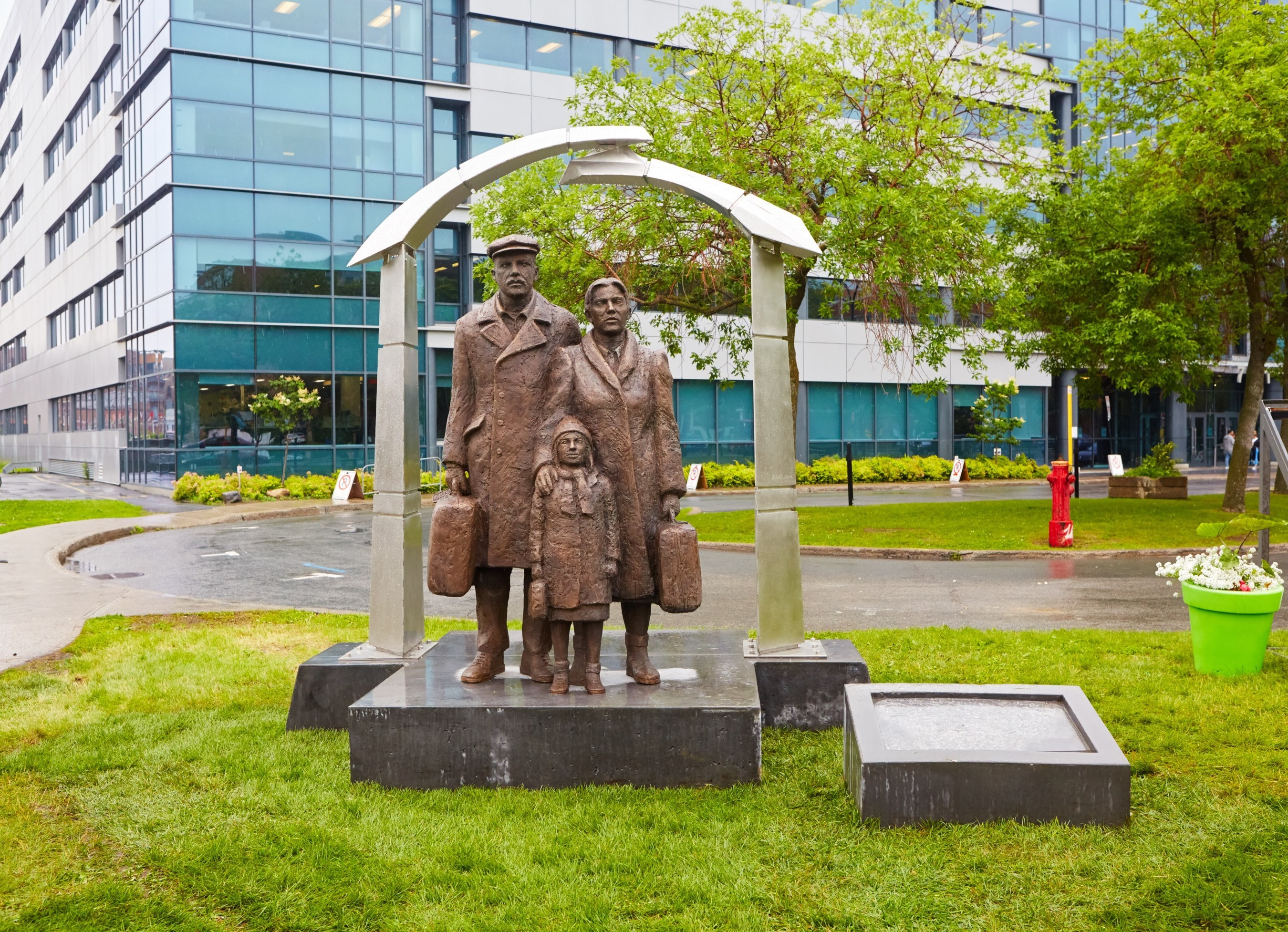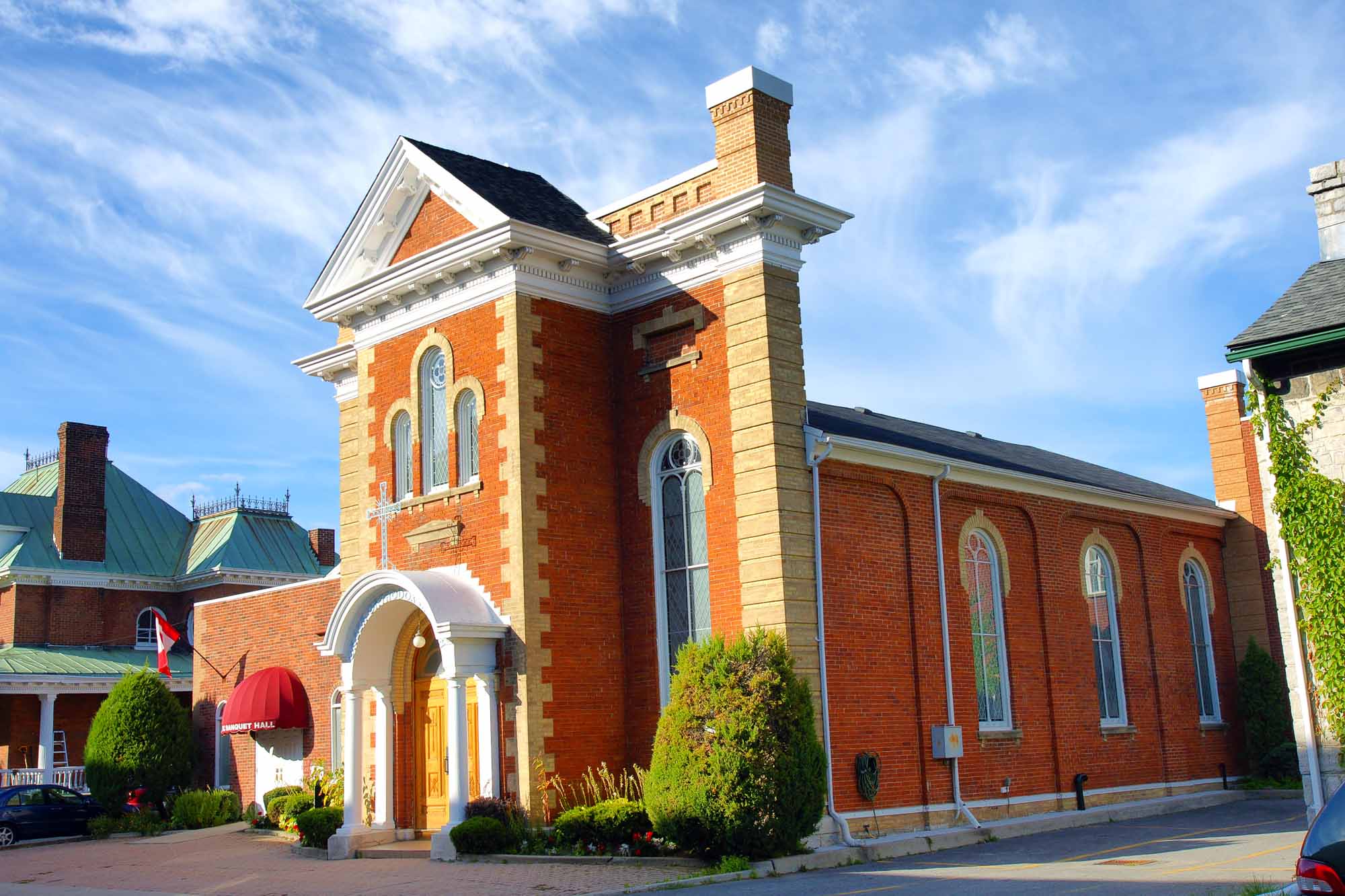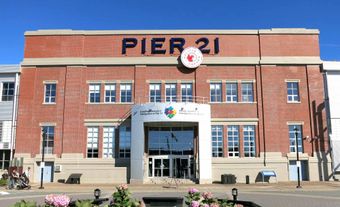Greek immigration to Canada began early in the 19th century. Greeks from the islands (e.g., Crete, Syros and Skopelos) and from the Peloponnesus, especially the poor villages of the provinces of Arcadia and Laconia, settled in Montreal as early as 1843. However, in 1871 only 39 persons of Greek origin were known to be living in Canada. Greek immigration, sporadic prior to 1900, increased considerably in the early 20th century as a result of poverty, war and political upheavals at home. The 2016 census recorded 271, 405 Canadians of Greek origin (141,580 single and 129,830 multiple responses.)

Statue of the Greek Immigrant by Giorgos Houliaras, located at the intersection of Jean-Talon West and Avenue du Parc in the Park-Ex neighbourhood of Montreal. The statue was commissioned by the Greek Community in honour of Montreal's 375th anniversary in 2017.
Photo: Groupe CNW/Ville de Montréal - Arrondissement de Villeray - Saint-Michel - Parc-Extension.
Migration and Settlement
In 1901, 213 Greek immigrants lived in Canada; in 1911 the number was 2,640; in 1931, 5,580 and in 1941, 5,871. Immigration was halted during the Second World War (WWII), but from 1946 to 1981 about 116,300 Greek immigrants entered Canada. According to the 2016 census, 271,405 Canadians are of Greek origin. Of this number, the majority live in the provinces of Ontario and Quebec (148,550 and 71,330, respectively.)
Economic Life
Generally speaking, immigrants who arrived prior to the Second World War had little formal education, yet some of them went on to become among the wealthiest members of the Greek community, in which they were very active. Post-WWII immigrants were over-represented in the unskilled occupational categories. In time, many of them moved up the social scale by establishing their own small businesses.
Immigrant entrepreneurs were actively involved in the restaurant business, the fur industry, fruit and grocery wholesale and retail firms, and travel agencies. Greek immigrants who were professionals typically worked as engineers, lawyers, doctors, university professors and civil servants. Canadian-born Greeks tended to enter higher professional and skilled occupations than their parents through higher academic attainment.
Social and Cultural Life
With the growth of Greek immigration after 1905, Greek settlements in Canada began to show signs of ethnic community formation (see also Ethnic Identity.) Cultural and patriotic associations were established first to help immigrants adjust to the new society, to combat prejudice and discrimination, and to preserve the Greek language and culture. In time ethnic associations generated an interest in the formation of parish communities to perform both religious and cultural functions.
In large Canadian cities Greeks tended to cluster in certain communities or neighbourhoods composed of their own ethnic background. The establishment of the first Greek Orthodox Churches in Montreal (1906) and in Toronto (1909) marked the beginning of Greek parish communities in Canada. The majority of Greek Canadians belonged to the Greek Orthodox Church, headquartered in Toronto. The church contributed to the preservation of Greek identity using the Greek language in religious services and through its devotion to Greek ideals. The leader of the Greek parish communities is the Metropolitan Bishop of Canada, through whom the church is associated with the Greek Orthodox diocese of North and South America. In 1993, 58 Greek Orthodox churches had been established throughout Canada to serve the spiritual needs of Greek Canadians.

Major Greek organizations include the American Hellenic Educational and Progressive Association, introduced into Canada from the US in 1928, the Greek Orthodox Youth of America, the Hellenic Canadian Federation of Ontario, the Hellenic Canadian Federation of Quebec and the Hellenic Canadian Congress. The congress was organized in 1986 to function as an umbrella organization for all Greek Canadians and to provide them with a united voice on the ethnocultural affairs at the federal governmental level. Many regional, philanthropic and social societies have been established to help newcomers and the regions from which they emigrated, and to promote understanding of Greek culture. The Veterans Association of the Greek National Resistance (1941-45) against Nazi occupation was established in 1981 in Montreal and Toronto and in 1991 in London, Ontario.
In the early 1980s a secular model of Greek community organizations appeared in various cities, including London, Sarnia and Markham in Ontario, and in Edmonton as an alternative to the traditional parish community structure. This type of organization constitutes an ethnocultural community without any religious functions of church affiliation. Greek Canadians are eligible for membership regardless of their religious background. The establishment of secular community structures are inevitable consequences of post-WWII demographic changes within Greek communities.
Several Greek Canadian newspapers, e.g., the Hellenic Tribune, the Greek Canadian Weekly, the Greek Courier, the Greek Canadian Press and the Hellenic Canadian Cultural Review, as well as magazines, have helped Greeks integrate into Canadian life while keeping them informed of events in Greece and Canada. Greek Canadians are also served by several Greek radio and television programs provided by multiethnic stations, particularly in the cities of Toronto and Montreal. Customs and traditions include celebrations of Greek national holidays (particularly March 25, Greek Independence Day), religious festivities and holidays and annual dances and picnics (see also National Holidays.)
Group Maintenance
Greek family and language schools play an important role in teaching children the Greek language and values, and in providing them with some sense of identity with Greek culture. Since the 1960s Greek language schools have grown in variety and enrollment. In the 2016 census 116,460 people in Canada reported Greek as their mother tongue (first language learned). The preservation of Greek culture is important to Greek Canadians as it provides them with personal pride for the contributions of their ancestors to Western civilization and a sense of identity and belonging.

 Share on Facebook
Share on Facebook Share on X
Share on X Share by Email
Share by Email Share on Google Classroom
Share on Google Classroom

